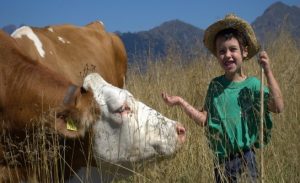 “Adotta una mucca”, (“Adopt a cow” in English) is an Italian initiative from the Valsugana Valley in the Trentino province. Its objective is to introduce tourists, children and families to mountain life and culture. Adopters can visit various Alpine huts, learn how mountain products are made faithfully following old recipes and enjoy cows on mountain pastures.
“Adotta una mucca”, (“Adopt a cow” in English) is an Italian initiative from the Valsugana Valley in the Trentino province. Its objective is to introduce tourists, children and families to mountain life and culture. Adopters can visit various Alpine huts, learn how mountain products are made faithfully following old recipes and enjoy cows on mountain pastures.
The project
The project “Adotta una mucca” was created in 1994 to introduce and valorise Alpine hut activities, products and culture in the Valsugana and Lagorai Valleys in North-Eastern Italy. The main objective of the project was to bring tourists to the mountains to discover the hut’s life and how mountain products are made
How does it work?
 Everyone can adopt a cow. The procedure is quite simple: online, on the Valsugana website, a brochure presents the alpine huts that participate in the project. Participants can choose their favourite hut and their favourite cow among a total of 150 cows coming from 15 different alpine huts in Trentino, Italy. A description accompanies every cow, displaying name and picture. Adopting a cow costs 60€: 10€ will be devoted to projects for children’s charities and 50€ will be given to the Alpine hut for the summer maintenance of the “adopted” cow. The 50€ can be used as a voucher by adopters, who, on their visit to their cow, can taste and buy various mountain products, from fresh and seasoned cheeses and ricotta to butter, toast and fresh milk, produced in the alpine hut. Adopters can visit the cow in its alpine hut during the pasture period from mid-June to mid-September. Moreover, the adoption can be offered as a gift to a friend or a relative. It has become very usual to offer “an adopted cow” for a wedding or a birthday present.
Everyone can adopt a cow. The procedure is quite simple: online, on the Valsugana website, a brochure presents the alpine huts that participate in the project. Participants can choose their favourite hut and their favourite cow among a total of 150 cows coming from 15 different alpine huts in Trentino, Italy. A description accompanies every cow, displaying name and picture. Adopting a cow costs 60€: 10€ will be devoted to projects for children’s charities and 50€ will be given to the Alpine hut for the summer maintenance of the “adopted” cow. The 50€ can be used as a voucher by adopters, who, on their visit to their cow, can taste and buy various mountain products, from fresh and seasoned cheeses and ricotta to butter, toast and fresh milk, produced in the alpine hut. Adopters can visit the cow in its alpine hut during the pasture period from mid-June to mid-September. Moreover, the adoption can be offered as a gift to a friend or a relative. It has become very usual to offer “an adopted cow” for a wedding or a birthday present.
The positive impacts
Over the years, the number of adoptions has significantly increased: in 2014, 962 cows were adopted, whereas in 2017, more than 1310 cows were adopted. This innovative project is successful and has positive socio-economic impacts:
- The project “Adotta una mucca” is a real example of collaboration between tourism and agriculture which enables people to get closer to mountain farming activities.
- By adopting a cow, paying a fee and showing interest in the project, participants sustain mountain activities, promote mountain products, get to know the alpine tradition and heritage and contribute to mountain solidarity.
For more information, please visit:
- The project’s brochure
- The project’s website
This project is an example of social innovation in marginalised rural areas. You can find it on the SIMRA’s database collecting social innovation examples.
This good practice was originally written for SIMRA
19 December 2017









